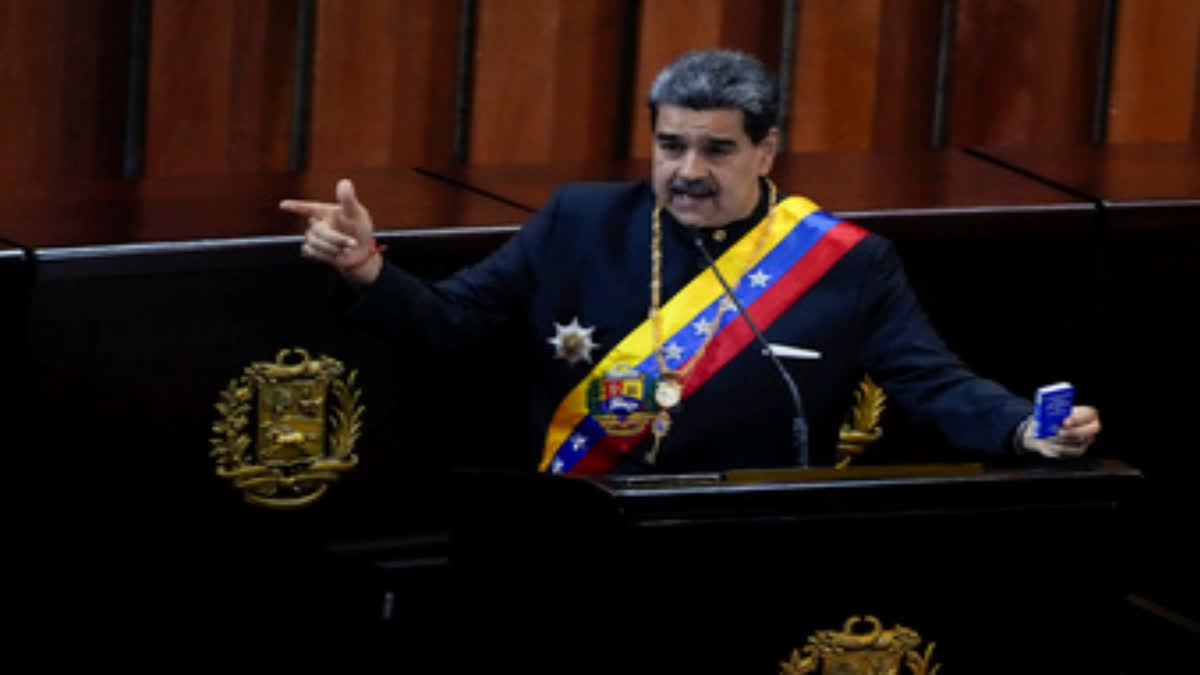Miami: A secret memo obtained by The Associated Press details a yearslong covert operation by the U.S. Drug Enforcement Administration that sent undercover operatives into Venezuela to surreptitiously record and build drug-trafficking cases against the country's leadership – a plan the U.S. acknowledged from the start was arguably a violation of international law.
"It is necessary to conduct this operation unilaterally and without notifying Venezuelan officials," reads the 15-page 2018 memo expanding "Operation Money Badger," an investigation that authorities say targeted dozens of people, including Venezuelan President Nicolás Maduro.
While there's no clear mechanism to hold the United States accountable legally, the revelation threatens to roil already fraught relations with Maduro's socialist government and could deepen resentment of the U.S. across Latin America over perceived meddling. It also offers a rare window into the lengths the DEA was willing to go to fight the drug war in a country that banned U.S. drug agents nearly two decades ago.
Some of Maduro's closest allies were ensnared in the investigation, including Alex Saab, the businessman recently freed in a prisoner swap for 10 Americans and a fugitive defense contractor. But until now, it was not clear that U.S. probes targeting Venezuela involved legally questionable tactics.
"We don't like to say it publicly but we are, in fact, the police of the world," said Wes Tabor, a former DEA official who served as the agency's country attaché in Venezuela well before the investigation described in the memo was launched.
Tabor, who would not confirm the existence of any such operations, said unilateral, covert actions can be an effective tool when conducted with proper limits and accountability, particularly in a country like Venezuela, where the blurred lines between the state and criminal underworld have made it an ideal transit point for up to 15% of the world's cocaine.
"We're not in the business of abiding by other countries' laws when these countries are rogue regimes and the lives of American children are at stake," he said. "And in the case of Venezuela, where they're flooding us with dope, it's worth the risk."
The DEA and Justice Department declined to answer questions from the AP about the memo, how frequently the U.S. conducts unilateral activities and the makeup of the panel that approves such operations.
Venezuela's communications ministry did not respond to requests for comment. But in recent days Maduro accused the DEA and the CIA — a regular target he uses to rally supporters — of undertaking efforts to destabilize the country. The CIA declined to comment.
"I don't think President Biden is involved," Maduro said in a televised appearance this month. "But the CIA and the DEA operate independently as imperialist criminal organizations."
TARGETING MADURO-The never-before-seen document was authored at the cusp of Republican President Donald Trump's " maximum pressure " campaign to remove the Venezuelan president.
Maduro had just taken an authoritarian turn, prevailing in what the Trump administration decried as a sham re-election in 2018. Within weeks, senior DEA officials plotted to deploy at least three undercover informants to surreptitiously record top officials suspected of converting Venezuela into a narco state.
But because the plan appeared to run roughshod over Venezuelan and international law, it required the approval of what is known as the Sensitive Activity Review Committee, or SARC, a secretive panel of senior State and Justice Department officials that is reserved for the most sensitive DEA cases involving tricky ethical, legal or foreign policy considerations.
It marked an aggressive expansion of "Money Badger," which the DEA and prosecutors in Miami created in 2013 and would go on to investigate around 100 Venezuelan insiders, according to two people familiar with the operation who spoke on the condition of anonymity to discuss law enforcement details.
By authorizing otherwise illicit wire transfers through U.S.-based front companies and bank accounts, the DEA aimed to unmask the Colombian drug traffickers and corrupt officials leveraging Venezuela's tightly controlled foreign currency exchange system to launder ill-gotten gains. But it expanded over time, homing in on Maduro's family and top allies, although the president would end up being indicted elsewhere, by the U.S. Attorney's Office in Manhattan, on drug trafficking charges.
None of the indictments of Venezuelans either before or after the 2018 memo made any mention of U.S. spying. And "to limit or mitigate the exposure of the unilateral activities," the document advised DEA officials to protect their informants and curtail in-person meetings with targets. It is not clear if "Money Badger" is still ongoing.
Since Democratic President Joe Biden took office in 2021, his administration has rolled back sanctions and brought few new prosecutions of Maduro insiders as the Justice Department's attention has turned to Russia, China and the Middle East. The Biden administration has also sought to lure Maduro back into negotiations with the U.S.-backed opposition, threatening to re-impose crippling oil sanctions if the OPEC nation doesn't abide by an agreement to hold fair and free elections this year. The operation targeting Maduro's inner circle is not the first time the United States has conducted law enforcement operations overseas without notifying a host country.
In 1998, Mexico castigated the United States for keeping it in the dark about a three-year money laundering sting known as "Operation Casablanca" — partly conducted on Mexican soil — that implicated some 160 people, including several bank executives.
